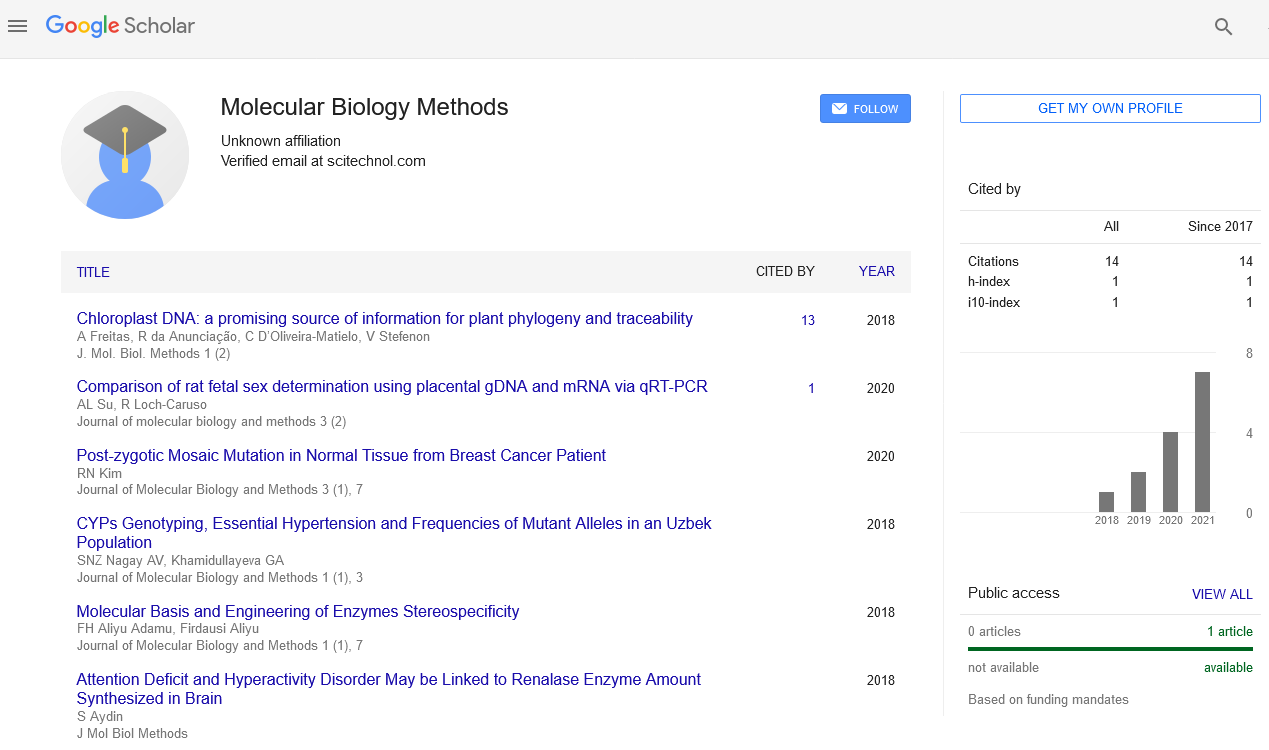Commentary, J Mol Biol Methods Vol: 7 Issue: 3
Understanding Epigenetics: The Science of Gene Regulation
Praveen Sasikumar*
1Department of Bioinformatics, Bharathidasan University, Tamil Nadu, India
*Corresponding Author: Praveen Sasikumar,
Department of Bioinformatics,
Bharathidasan University, Tamil Nadu, India
E-mail: sasikumarpraveen@ac.in
Received date: 26 August, 2024, Manuscript No. JMBM-24-151570;
Editor assigned date: 28 August, 2024, PreQC No. JMBM-24-151570 (PQ);
Reviewed date: 11 September, 2024, QC No. JMBM-24-151570;
Revised date: 18 September, 2024, Manuscript No. JMBM-24-151570 (R);
Published date: 25 September, 2024 DOI: 10.4172/JMBM.1000168
Citation: Sasikumar P (2024) Understanding Epigenetics: The Science of Gene Regulation. J Mol Biol Methods 7:3.
Description
Epigenetics is a rapidly evolving field that delves into the complex mechanisms that regulate gene expression beyond the traditional understanding of DNA sequences. While classical genetics focuses on the inheritance of traits through DNA, epigenetics discusses how environmental factors and lifestyle choices can influence the activation and silencing of genes without altering the underlying genetic code itself. This dynamic combination between genetics and the environment shapes not only individual development but also contributes to a wide array of biological processes and diseases.
At the heart of epigenetics are modifications that affect how genes are expressed. The most well-known mechanisms include DNA methylation, histone modification and non-coding RNA molecules. DNA methylation involves the addition of a methyl group to the DNA molecule, typically at cytosine bases, which can inhibit gene expression. This process is important during development, as it helps cells differentiate into various types, each with specific functions. For example, while all cells in the body carry the same DNA, methylation patterns allow stem cells to develop into heart cells, neurons, or skin cells, effectively guiding cellular identity.
One of the most exciting aspects of epigenetics is its potential to explain how environmental factors influence gene expression and contribute to health and disease. For instance, studies have shown that exposure to toxins, diet, stress and even social interactions can lead to epigenetic changes that may have lasting effects on an individual’s health. A prominent example is the research on the impact of maternal nutrition during pregnancy. Children born to mothers who experienced malnutrition are more likely to develop metabolic disorders later in life, a phenomenon attributed to epigenetic modifications that occur in response to the mother's nutritional status.
Furthermore, epigenetics has significant implications in understanding complex diseases such as cancer. Tumor cells often exhibit distinct epigenetic alterations that enable them to proliferate uncontrollably and evade normal cellular mechanisms. For instance, the silencing of tumor suppressor genes through DNA methylation is a common feature in many cancers. This understanding has paved the way for novel therapeutic approaches, including drugs that target epigenetic modifications, offering new hope in the fight against cancer and other diseases.
The reversibility of epigenetic changes also presents exciting possibilities for therapeutic interventions. Unlike genetic mutations, which are permanent alterations in the DNA sequence, epigenetic modifications can potentially be reversed. This has led to the development of epigenetic therapies aimed at restoring normal gene function in diseases characterized by aberrant epigenetic regulation. Researchers are actively studying the use of small molecules that target specific enzymes involved in histone modification or DNA methylation, demonstrating promising results in preclinical and early clinical trials.
Ethical considerations also emerge in the world of epigenetics, particularly regarding potential applications in human enhancement and gene editing technologies. As our understanding of the epigenome grows, so does the potential for manipulation, which raises questions about the ethical implications of altering human biology and the societal impacts of such advancements.
Epigenetics represents a revolutionary shift in our understanding of biology, emphasizing that gene expression is not solely determined by genetic information but is also deeply influenced by environmental factors and experiences. The field holds promise for advancing personalized medicine, developing new therapeutic strategies and addressing multiple health challenges.
 Spanish
Spanish  Chinese
Chinese  Russian
Russian  German
German  French
French  Japanese
Japanese  Portuguese
Portuguese  Hindi
Hindi 